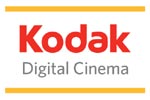
For the past several weeks there have been whisperings in conversations throughout the motion picture exhibition industry about organizational changes at Kodak Digital Cinema. To put an end to the conflicting reports that were coming my way I did the most simple of things; picked up the phone and spoke with someone directly at Kodak. Strange, I know, given that this business has gotten us all so used to playing our cards close to the vest, but sometimes a direct approach actually works.
Indeed, Kodak Digital Cinema is dramatically changing the focus of its business. Bob Gibbons, Director of Marketing and Communications for Kodak Digital Cinema lived up to his title by being very upfront in explaining the company’s new strategy. “We’re going to really concentrate on areas that build more directly on our unique capabilities of service and intellectual property licensing,” said Gibbons. “We’re going to discontinue all development and manufacturing of our preshow advertising systems, our Kodak screen management servers, our Kodak theatre management systems and what I refer to as our role as a feature systems integrator, putting the packages together and marketing the packages.”
Acting as a systems integrator has been the most visible part of Kodak’s digital cinema business up until now. Moving forward, Kodak Digital Cinema will instead develop and license digital cinema technologies to be commercialized by others while continuing to provide services and support for existing systems. Though Kodak may not be manufacturing preshow video players any longer, they will continue to prepare and distribute preshow content and playslists.
Gibbons puts the number of Kodak digital cinema servers out in the field at around 300 and he was firm in reiterating that the company would absolutely continue to provide service and support for their equipment. However, he stated, “If you are thinking of working with Kodak as an integrator and having us put a package together for you, well we’re not going to do that anymore so you’ll have to move on and work with somebody else.”
Other aspects of the business that will continue is Kodak’s network operations center which monitors the health of digital cinema equipment on a round the clock basis. Kodak’s diagnosis most of the problems that occur with installed equipment remotely from their NOC. They are often able to fix the problem without sending technicians. As for any intellectual property the company may be working on for digital cinema, Gibbons said, “Kodak has a long history in imaging and different aspects of picture quality. We have somewhere around 500 patents in the digital area alone and so we’re going to continue to develop some of that and so far as people want to license that and put it in their products we’d be happy to talk with them.”
According to Gibbons, Kodak has no plans to sell any assets developed by Kodak Digital Cinema that may no longer be called for due to their new strategy. This includes their proprietary secure media server and theatre management system. Though never say never, because if you gave Kodak a call and were interested in licensing the intellectual property Kodak built for its servers, “we sure would be interested in talking to you,” he said. “I don’t want to say we’re not doing that, but at this point we are not doing it.”
Of course, whenever a company like Kodak shifts its business strategy there are bound to be a few casualties when it comes to personnel. Since Kodak is such a large company some of the engineers may well end up in other assignments. Same goes for those working in sales. But in the end there will be some layoffs, however small. “We’re not talking about a gigantic operation here,” said Gibbons. “When we get all done with the number of people who will be let go because of jobs being eliminated it will be in the dozens. A couple dozen. It won’t be more than that.”
Speaking about the news with exhibitors who had been working with Kodak as system integrators, the reactions ranged from disappointed to bitterly angry. Some theater owners had been with Kodak for years, while others had only recently signed on. All of them seemed to question digital cinema’s current business model given that both Kodak and Technicolor have gotten out of the systems integration business over the past year.
On a side note, all references to Kodak Digital Cinema have been removed from Kodak’s corporate website.
- As Sundance Says Goodbye to Park City, Its Films Look Forward - January 21, 2026
- Opening Night at the 2025 Red Sea Film Festival Showcases Saudi Arabia’s Growing Cinematic Ambition - December 5, 2025
- Arts Alliance Media Enters Administration — But Don’t Write Its Obituary Yet - November 21, 2025